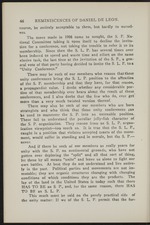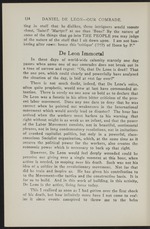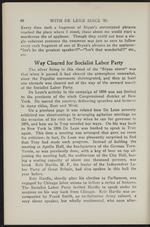| 1 |
 |
“...who think that these unity conferences pan
be used to maneuver the S. P. into an untenable position.
These fail to understand the peculiar jelly-fish character of
the S. P. organization. They reason from an S. L. P. organ-
ization viewpointtoo much so. It is true that the S. L. P.,
caught in a position that violates accepted tenets of the move-
ment, would suffer in standing and in morale, but the S. P.
never.
And if there be such of our members as really yearn for
unity with the S. P. on sentimental grounds, who have not
gotten over deploring the split and all that sort of thing,
let these by all means unite and leave us alone to fight our
own battles. At best they do not understand and live entire-
ly in the past. Political parties and movements are not im-
mutable; they are organic structures changing with changing
conditions of which conditions they are the products. The
lay of the land in the United States is today such that there
HAS TO BE an S. P., and, for the same reason, there...”
|
|
| 2 |
 |
“...have commanded at-
tention. There is surely no one now so bold as to declare that
De Leon was a fanatic in his often bitter criticism of the pres-
ent labor movement. Does any one dare to deny that he was
correct when he pointed out weaknesses in the International
movement which would surely lead to disaster? The hour has
arrived when the workers must harken to his warning that
right without might is as weak as an infant, and that the power
of the Labor Movement consists, not in Ijeautiful, sentimental
phrases, not in long condemnatory resolutions, not in imitations
of crooked capitalist politics, but only in a powerful, class-
conscious Socialist organization, which, at the same time as it
secures the political power for the workers, also creates the
economic power which is necessary to back up that right.
However, De Leon would feel deeply wounded could he
perceive our giving over a single moment at this hour, when
action is needed, to moping over his death. Such was not his
idea of a soldier...”
|
|
| 3 |
 |
“...one thousand persons, was
hired. Keir Hardie, M. P., the leader of the Independent La-
bor Party of Great Britain, had also spoken in this hall the
year before.
Keir Hardie, shortly after his election to Parliament, was
engaged by Chicago labor unions to deliver a series of lectures.
The Socialist Labor Party invited Hardie to speak under its
auspices on his way back from Chicago. Keir Hardie was ac-
con>panied by Frank Smith, an ex-Salvation Army colonel, a
very clever speaker, but wholly sentimental, who soon after-...”
|
|
| 4 |
 |
“...whom
the capitalists of Nevada sought to brand as a murderer.
Morrie R. Preston, an official of the Industrial Workers of
the World, in exercising the right to picket, was attacked
by the proprietor of a restaurant the employes of which
were out on strike. The proprietor leveled a pistol at Pres-
ton; Preston in self-defense drew his gun and laid low the
man who wanted to take his life. Class justice, capitalist
class justice, declared that Preston was guilty of murder.
It was not for any sentimental reason that Preston was
picked out by the Socialist Labor Party as its Presidential can-
didate; It was to bring before the American working class
the question of the right to picket in a strike, and correctly...”
|
|
